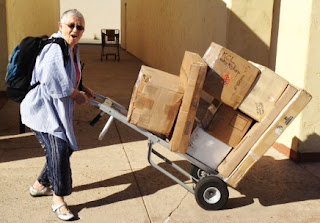Gift of A
Mentor
Making arrangements to do our art
in a place away from our home studio is something of an ordeal. Not only do you
have to make all of the travel and lodging reservations, you have to anticipate
the work you will do, pack all of the appropriate materials, and ship your
“boxed-up studio” to Ventura within the designated time frame.
Preparing to Work With A Mentor
Preparing to Work With A Mentor
This year I struggled with
the Open Studio requirement that you bring eight images of recent
work. Two years ago I began a body of work related to humanity’s migrations out
of East Africa to every corner of the globe. At that time
I focused on our common origins in Africa, completing five paintings in the
first year after my last Open Studio. These were published in our book, Art Twenty-Eleven, so I could hardly
call them “recent work”.
Since then, I had gotten sidetracked
into publishing PILGRIMAGE Wonder
Encounter Witness and helping edit four other books. I had also taken 18
months to teach a Heritage Mandala class based on the migration journey of each
participant as revealed in individual DNA tests. I did this because I wanted
Children of Eve to be grounded in my own truth. Researching each stage of my
migration journey and those of my students had resulted in binders filled with articles
and online material.
Completing the Heritage Mandala, I tried to get back into painting large again by pulling out former unfinished paintings and practicing on them. I got one quarter-sheet painting out of that endeavor. I call it “My Multicultural Fertility Goddess.”
So my compilation of “recent work”
consisted of two paintings: my Heritage Mandala and my fertility goddess.
Wanting to conform to the eight images requirement and at the same time be
honest, I pulled out two of the visual journals I’ve been keeping over the last
couple of years and photographed six pages. That may have been fortuitous.
During the first two days of Open
Studio, each artist has a twenty-minute session with Liu in which she reviews
the eight images and discusses what is evolving in the artist’s work. Reviewing
my images, Liu allowed as how my mandala could be in a section of the Eve
exhibition on my own journey. Good. However,
my fertility goddess seemed “too hip” for the Eve series. My heart sank.
Continuing through the images, she asked, “Are you into book arts?” “Sort of,” I
replied tentatively. I mentioned that I’d been thinking of having installation
components with the paintings.
My recent lack of productivity
must have signaled an impasse. Liu said, “When content is so large, it’s easy to get
overwhelmed. Why don’t you go geographical? You think that way and
it brings to mind the culture, the fabrics, the language and food for you.
You’re a writer, so start writing. I know you. You work by chapters. Start with
Southeast Asia since that’s where the first migration went.”
“Can I use collage?” I queried.
“Collage is part of your vocabulary,” she replied. “What about installation
components?” I asked. “Your sketchbooks can be part of the exhibition." Bingo! "They
can be on pedestals in front of the paintings to which they relate. Maybe you
can have some things on the floor.” Relief swept through me.
I went to my space and immediately made a chart of the geographical chapters. I could see how some of the research material I had gathered might be included in the sketchbooks. I took out a new sketchbook and began writing about Southeast Asia. I decided the underlay for each composition would be geographical. Next day I pulled out my maps and began tracing Southeast Asia and the Pacific Islands (SEAPAC).
The geography of SEAPAC is huge. I
determined that I wanted Southeast Asia and Australia to be dominant. I decided
the islands needed to be two smaller paintings that would visually overlap with
a bigger Southeast Asia painting. Together it would be a triptych, with each piece
hanging at different distances from the wall.
I brainstormed in my sketchbook, recalling experiences I’ve had in that part of the world. One
evening as I reflected in my hotel room the sketch for the triptych flowed from
my pencil onto the page. Over the ensuing days I got a good start on the
triptych.
Most mornings during Open Studio Liu makes a visual presentation. Two I especially
appreciated were on Installation Work and Abstraction. Other presentations also
fed my imagination.
After the first two days of
individual reviews are done, Liu makes daily rounds. She systematically goes
artist by artist from one end of the room to the other, checking to see if we
have questions. It is not that I or other artists could not figure things out
on our own. It is that having her eye helps us move faster.
For example, I had purchased some
cloth to experiment with it as collage material. When I showed Liu the sketch
for the triptych and told her how I was thinking of using the cloth, she commented,
“In working with fabric, use it where wrinkles won’t matter and do layers.” She
also suggested that I do another part of the design in layers of paper. I saw
immediately that this would complement the cloth, making it not a singular
collage element.








